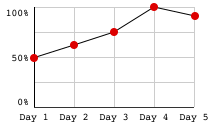Now that we know about vector functions, let's apply calculus to these functions!
Limits with Vector Functions
Limits of a vector function works in this way:
Derivatives with Vector Functions
Derivatives of a vector function are done in the following way:
Integrals with Vector Functions
Indefinite integrals of vector functions are done in this way:
Definite integrals of vector functions work like this:






